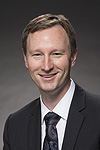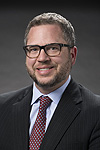Making the case
 |
|
Tim Meyer
|
Last week was marked by two important milestones — maybe more if you include my daughter's success at delivering one (and only one) spoonful of yogurt from bowl to mouth all by herself.
Some of you may have already met John Myer, who joins us as Fermilab's new general counsel. John takes the reins from Gary Leonard, who has served the lab for many years. Please join me in welcoming John and thanking Gary for his sincere commitment to Fermilab's success.
 |
|
John Myer
|
John comes to us from Ingersoll Rand/Trane, where he was leader of the company's Global Center of Excellence for Government Contracts. John was lead counsel for all aspects of federal contracting and compliance and has 15 years of experience in government contracting, commercial litigation, and drafting and negotiating complex prime and subcontracts, including construction projects. Not only will John lead the legal department, but he will also provide key advice to lab leadership as we navigate the path to hosting an international science facility for long-baseline neutrino experiments.
The other key milestone last week was Fermilab's presentation of its strategic plan and FY2017 budget considerations to DOE's Office of High Energy Physics. In an all-day meeting at the DOE Germantown, Maryland, offices, the Fermilab team presented an outlook to 2020 for the six strategic themes developed over the course of the year and identified what would be required in FY2017 to advance toward those goals. The talks were kept at a high level and focused on strategies, Fermilab's core and unique capabilities and potential trade-offs.
The budget briefing was judged a success on several counts. First, in spite of a massive snowstorm barreling down on Washington, DC, that closed the city the next morning, all of the participants were present and engaged throughout the full eight-hour marathon session. Second, the DOE program managers each had a chance to learn about and discuss broader and different aspects of the Fermilab program. Third, there was substantial subsequent discussion about how best to plan for and support the primary and preponderant role that Fermilab plays in executing the P5 vision. Last and not least, the Fermilab team delivered a clear and consistent message about focused priorities and a commitment to excellence. (We are collecting the materials on an Indico website that soon will be available for viewing.)
The FY2017 briefings came together during an intense push throughout the month of February; collectively, it took more than 500 hours of effort. We would not have been successful without the leadership, patience and guidance of my co-convener, Fermilab CFO Cindy Conger. Hats off to Cindy, her team and the rest of our colleagues for successful preparation and presentation of Fermilab's vision to DOE!
|